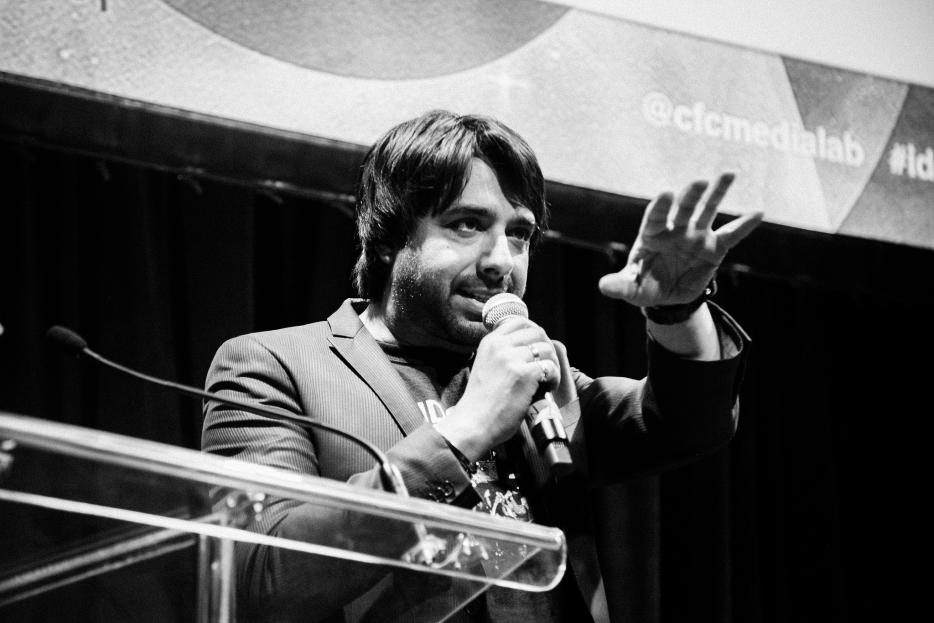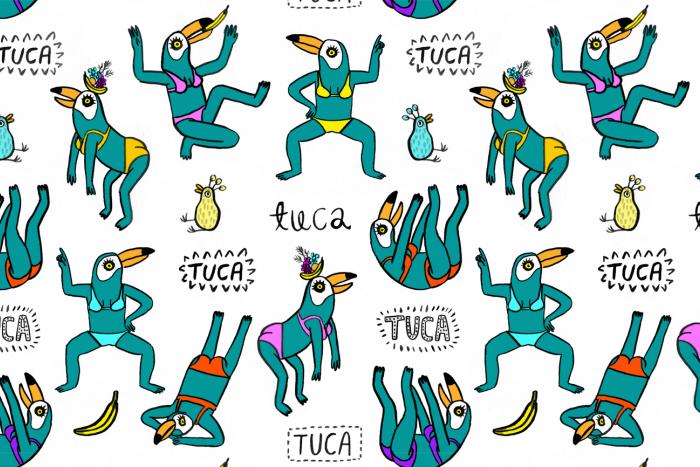For two weeks now, women have been breathing a little easier, holding their heads just a little higher and savouring the rare embrace of public support, as the neon halo of “Renaissance man” Jian Ghomeshi has flickered and gone dark. Ghomeshi never saw it coming, that backlash to the blacklash he’d tried to trigger on Facebook by accusing a supposedly jilted girlfriend of fabricating lies after he refused to become monogamous in the year-long relationship. But we’ve all learned so much in such a short time.
Not many saw the sea change in public adoration for Ghomeshi coming. Not the women who fell for his alleged brand of wink-whack feminism; the liberals who threw their words behind him then swiftly reeled in their tweets; or the fans who struggle to reconcile his silky voice with his sinister behaviour.
But the revolution needed to forever rip the scarlet letter from the chests of sexual assault victims will have to sustain a great deal longer, especially if Ghomeshi is charged. He's hired a shrewd team of witness-shredding lawyers to stall, plead out or fight for him if necessary. Nevertheless, he’d find himself at first safer in cuffs than in the court of public opinion, which has for once sided not with historic misogyny but with change. Once inside the criminal justice system, the power reverts to the former CBC host, whose liberty would be at stake. The question is whether the current outrage might translate into a similar demand for more respect for victims inside our courts.
The blueprint for victim assailing appears as an early draft in Ghomeshi’s civil lawsuit. As respected (and feared) labour lawyer Howard Levitt spotted immediately, the challenge itself is the legal equivalent of a public relations stunt: a CBC union member, as Ghomeshi was, cannot sue. But by filing the suit, he was able to establish the narrative of a spurned woman gone ballistic without fear of being sued himself.
At trial, victims will need to prove—beyond a reasonable doubt—that Ghomeshi did what they say he did. That’s a tall order for such a secretive crime; these cases typically benefit from physical evidence and rock solid credibility that defence lawyers spend hours undermining. (When applying for articling positions as a young law student, one senior partner practically drooled looking me up and down. “You’d be an incredible weapon for us. All blonde and blue eyed telling the jury what a whore the accuser is and how our guy sure doesn’t look like a rapist to you.” He laughed hard. I turned down the job.)
As University of Windsor law professor David Tanovich recently wrote: “There is a culture of intimidation, denial and blaming by police, lawyers, judges and juries that plays a significant role in explaining why so many women do not report their assault and why there are more acquittals in sexual assault cases than for any other offence.”
Or as Kim Stanton, the director of the Legal Education and Action Fund, told me, sadly, in a telephone interview: “It’s going to be hell on wheels no matter how much support the women have right now. They are still the ones who will be cross-examined about painful experiences, first (by) the police, then at the preliminary inquiry and then the trial.” Although feminists have won some protections—limits on dragging past sexual history into evidence, for instance—many agree that the cultural history of women hating and victim blaming translates into a distorted perception of the accuser as the guilty party.
That much of the legal pummelling may come from one of Canada’s leading female lawyers, Marie Henein, has not escaped the feminist community. “Of course Ghomeshi hired the toughest woman he could find. All the more effective to sic a woman on another woman so there’s not much to say when she destroys her credibility. She’s the stand-in for Jian, his shill and his gender-bending credibility,” said another female criminal lawyer who spoke on the condition of anonymity. “Like all of us, Marie was taught that everyone is entitled to a strong defence, and she can be vicious, but some of us prefer not to use our skills to undermine women’s character or rights.”
While the Ghomeshi revelations have sparked a tidal wave of telling long hidden truths, there are some women who see only bleakness ahead as the public outcry dissipates and courtroom eviscerations begin. Editor-in-chief of The Ethnic Aisle, Denise Balkissoon, is pessimistic in light of the indifference shown victims of male violence, including hundreds of indigenous women who’ve been kidnapped, raped, and killed in this country. “I’m not swayed by the newly enlightened, standing with outstretched, protective arms, advising victims of violence that there’s no longer a need to be ashamed or afraid of coming forward. Let me tell you what too many have heard, and will continue to hear, perhaps forever. I do not believe you,” she wrote in the Globe and Mail.
But internationally renowned activist Sally Armstrong, with her trademark fighting spirit, is challenging people, especially men, to quickly help enshrine the new support for victims, evidenced by the millions of positive Tweets and postings amassing online under hashtags such as #BeenRapedNeverReported, #IBelieveLucy and #IBelieveThem. “The earth is shifting under the status of women,” she told me. “The events of the last ten days could lead to a sea change in our courage to tell and wisdom to listen. The cost of silence is staggering.”
That unprecedented public airing of unjust private shame is already translating into change on other fronts. In a telling move, high-profile criminal lawyers who typically defend clients accused of sex crimes are instead offering free assistance to women in the Ghomeshi case. “By offering people who are prepared to make allegations an opportunity to have legal representation, it might in some fashion remove the inherent fear that they may have of being re-victimized through the process,” Alvin Shidlowski told the Star.
“There are many legitimate reasons why women don’t (report). ... It’s easier actually to file a harassment complaint than a criminal charge but even that can be career-ending if the accused ends up remaining in his position. Even if the (victims) don’t get eventually downsized, the atmosphere from the accused and his supporters can become toxic.”
Pro bono lawyers will guide the women who come forward through the legal process, prepping them for cross-examination and defusing rape myths. “They have nothing to be ashamed of,” says lawyer Marcy Segal. “Just because you may consent to a date, just because you may consent to a kiss, just because you may consent to some touching, it doesn’t mean that you consent to any sexual activity thereafter.”
That message has new prominence online, too—part of the debunking of rape myths sparked ironically by Ghomeshi’s pre-emptive strike at potential accusers. "People are more sophisticated than ever before about crisis communications. They are both more perceptive, and less forgiving, on Social Media. And the Ghomeshi Facebook post, in which he tried to 'get out ahead of the story,' is evidence of this. If you are caught with a tactic rather than sincerity and transparency, that's Strike 1,” public relations expert Bill Walker, author of the new book, Crisis Communications in the 24/7 Social Media World, told me in an email interview. "In today's crisis communications world, people will instantly judge your initial response. Sometimes the ineffectiveness of that response can be as damaging, or more damaging, than the crisis itself. This was the case for Ghomeshi.”
"The reason Ghomeshi's Facebook post was such a disaster is that it failed the basic test of crisis communications responses: is this person or organization speaking clearly in the public interest? That's best practice. Or is this person speaking out in self-interest? That is almost always a path to failure. Ghomeshi's Facebook rant was clearly based on self-interest. Strike 2.
"Finally, all evidence points to the fact that the truth was not on Ghomeshi's side, or at the very least, major relevant facts were not disclosed by him. Evidence of a lie can be Strikes 1-2-and-3 in any crisis. In this case, it was Strike 3.”
Where Ghomeshi failed online, others successfully used the Internet to educate his audience. Sex Geek blogger Andrea Zinan gutted Ghomeshi’s attempted “rough sex” defence—and later told me in a telephone interview that she was utterly astounded at the positive feedback she received online, along with a big increase to 250,000 hits in a day. “Beginner BDSM this is not,” she wrote. “As a BDSM educator, I have been teaching how to do safe body punching for over a decade, and I don’t go near the face except symbolically (fake or very light impact for psychological effect). It’s just too easy to do major damage.”
Ghomeshi is also accused of choking and depriving victims of air while pinning them down. Zinan was able to put that into context, too, thanks to the freedom of Internet publishing. “As for choking, it’s a topic of massive debate among pervs, with some veteran kinksters even insisting that there is simply no safe way to do it and therefore shouldn’t be done at all.
“I’m not saying everyone agrees on the absolute-no approach. But I am saying that Ghomeshi’s argument that what he does is a ‘mild version of Fifty Shades of Grey’ does not match up with his apparent practice of engaging in very high-risk activities with women he’s just beginning to date.” This was critical information for the majority of people who either don’t practise or understand kink culture, but were closely following the #jianghomeshi discussion. It was eye-opening, too, to learn that the BDSM community respected itself far more than Ghomeshi appeared to, and that he’d offended them with his attempt to co-opt BDSM as camouflage for alleged non-consensual violence.
Something similar happened when lawyer Levitt stripped away the strategy behind the astronomical $55-million lawsuit Ghomeshi had launched against the CBC. Levitt laid bare the big and ugly bluff meant to intimidate potential witnesses and victims. “It looks bizarre until you realize that what the lawsuit is really about isn’t winning in court,” he wrote in the National Post on Day One of the fallout: “It’s about Ghomeshi being able to say whatever he wants in legal documents with total protection from being sued for libel himself, while intimidating women from going public with allegations of assault at Ghomeshi’s hands.”
Ultimately, Ghomeshi’s Facebook defence was stripped of both its legal and sexual underpinnings, leaving his victim-blaming flagrante delicto. That brought out the caring and the concerned, the victims and the scared-to-report, and suddenly the mobbing so familiar online went pro- rather than anti-female. And the false notion that only women who file police complaints are likely to be telling the truth (even though they’re often disbelieved anyway) is now widely discredited. Call it the Ghomeshi Paradox: By attempting to thoroughly discredit the victim, he lost his own credibility.
“There are many legitimate reasons why women don’t (report),” lawyer Levitt said in an interview. “It’s easier actually to file a harassment complaint than a criminal charge but even that can be career-ending if the accused ends up remaining in his position. Even if the (victims) don’t get eventually downsized, the atmosphere from the accused and his supporters can become toxic.”
The dam fully broke, as several online scribes pointed out, when Trailer Park Boys actor Lucy DeCoutere became the first to formally complain to police that the radio host had choked and slapped her without warning or consent. It was a courageous move. The mainly men and boys who denigrate women online (a la 4chan, Reddit, revenge porn boards and many chat rooms) could have “doxed” her (notoriously popular practise of documenting a target's address, telephone number, social media handles to encourage Internet-wide harassment) and sent rape and death threats. Yet, “so many people are responding in a way so positive,” DeCouture told CTV, “indicating that so many people have been in a situation that has been negative, and that sort of slays me, because really? How many people are in pain right now? A lot more than people knew.” And the police, she says, treated her with care and respect.
So, is there hope—even as this case appears to be heading to court? Amid the theft of (mainly) female celebrities’ sex photographs and videos; and against the cacophony of girl-hating in #Gamergate and “slut-shaming” on thousands of other apps and sites, are decent, civilized people finally reaching a critical mass sufficient to outpace and out-post the cyberabusers and the victim blamers?
Sitting recently with the father of suicide victim Rehtaeh Parsons at a girls’ empowerment conference in Ajax, Ont., I saw his eyes smart with tears as he explained how long victims have waited for this anti-backlash movement. “Jian Ghomeshi relied on the old-school thinking, the rape myths, and the victim blaming that predators use. He started the conversation and someone else changed it and he had no control over that at all and when that changed it blew up in his face,” says Glen Canning, who believes the sexual assaults of his daughter and the subsequent sharing of photographs from the scene led to her suicide.
“I think we were all just fed up, sick of the negativity toward women and girls, the victim blaming and the lies. The only bright light in this scandal is that people are uniting online to support the victims. We must believe them.”






